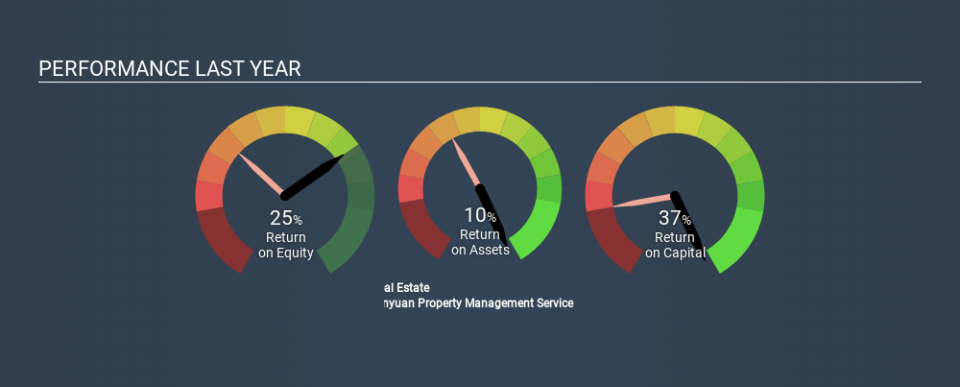Why Xinyuan Property Management Service (Cayman) Ltd. (HKG:1895) Looks Like A Quality Company

Many investors are still learning about the various metrics that can be useful when analysing a stock. This article is for those who would like to learn about Return On Equity (ROE). We'll use ROE to examine Xinyuan Property Management Service (Cayman) Ltd. (HKG:1895), by way of a worked example.
Xinyuan Property Management Service (Cayman) has a ROE of 25%, based on the last twelve months. That means that for every HK$1 worth of shareholders' equity, it generated HK$0.25 in profit.
View our latest analysis for Xinyuan Property Management Service (Cayman)
How Do You Calculate ROE?
The formula for ROE is:
Return on Equity = Net Profit (from continuing operations) ÷ Shareholders' Equity
Or for Xinyuan Property Management Service (Cayman):
25% = CN¥67m ÷ CN¥270m (Based on the trailing twelve months to March 2019.)
Most know that net profit is the total earnings after all expenses, but the concept of shareholders' equity is a little more complicated. It is the capital paid in by shareholders, plus any retained earnings. You can calculate shareholders' equity by subtracting the company's total liabilities from its total assets.
What Does ROE Signify?
ROE looks at the amount a company earns relative to the money it has kept within the business. The 'return' is the yearly profit. The higher the ROE, the more profit the company is making. So, all else being equal, a high ROE is better than a low one. That means ROE can be used to compare two businesses.
Does Xinyuan Property Management Service (Cayman) Have A Good Return On Equity?
Arguably the easiest way to assess company's ROE is to compare it with the average in its industry. The limitation of this approach is that some companies are quite different from others, even within the same industry classification. Pleasingly, Xinyuan Property Management Service (Cayman) has a superior ROE than the average (8.4%) company in the Real Estate industry.
That is a good sign. We think a high ROE, alone, is usually enough to justify further research into a company. For example you might check if insiders are buying shares.
How Does Debt Impact ROE?
Most companies need money -- from somewhere -- to grow their profits. That cash can come from issuing shares, retained earnings, or debt. In the first two cases, the ROE will capture this use of capital to grow. In the latter case, the debt required for growth will boost returns, but will not impact the shareholders' equity. That will make the ROE look better than if no debt was used.
Xinyuan Property Management Service (Cayman)'s Debt And Its 25% ROE
Shareholders will be pleased to learn that Xinyuan Property Management Service (Cayman) has not one iota of net debt! Its impressive ROE suggests it is a high quality business, but it's even better to have achieved that without leverage. After all, with cash on the balance sheet, a company has a lot more optionality in good times and bad.
The Bottom Line On ROE
Return on equity is a useful indicator of the ability of a business to generate profits and return them to shareholders. Companies that can achieve high returns on equity without too much debt are generally of good quality. If two companies have around the same level of debt to equity, and one has a higher ROE, I'd generally prefer the one with higher ROE.
Having said that, while ROE is a useful indicator of business quality, you'll have to look at a whole range of factors to determine the right price to buy a stock. It is important to consider other factors, such as future profit growth -- and how much investment is required going forward. Check the past profit growth by Xinyuan Property Management Service (Cayman) by looking at this visualization of past earnings, revenue and cash flow.
Of course, you might find a fantastic investment by looking elsewhere. So take a peek at this free list of interesting companies.
If you spot an error that warrants correction, please contact the editor at editorial-team@simplywallst.com. This article by Simply Wall St is general in nature. It does not constitute a recommendation to buy or sell any stock, and does not take account of your objectives, or your financial situation. Simply Wall St has no position in the stocks mentioned.
We aim to bring you long-term focused research analysis driven by fundamental data. Note that our analysis may not factor in the latest price-sensitive company announcements or qualitative material. Thank you for reading.

